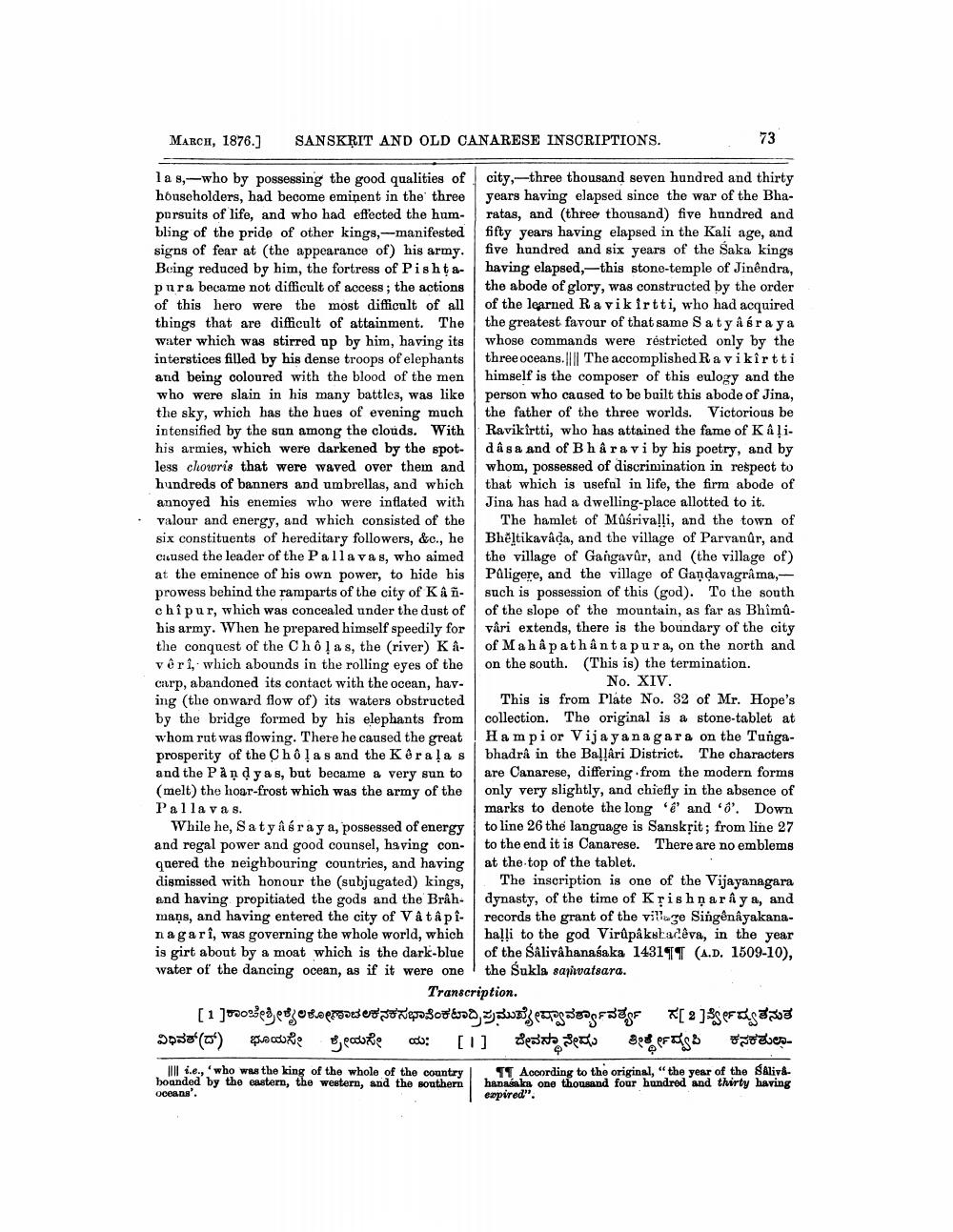________________
MARCH, 1876.]
la s,-who by possessing the good qualities of householders, had become eminent in the three pursuits of life, and who had effected the humbling of the pride of other kings,-manifested signs of fear at (the appearance of) his army. Being reduced by him, the fortress of Pishtapura became not difficult of access; the actions of this hero were the most difficult of all things that are difficult of attainment. The water which was stirred up by him, having its interstices filled by his dense troops of elephants and being coloured with the blood of the men who were slain in his many battles, was like the sky, which has the hues of evening much intensified by the sun among the clouds. With his armies, which were darkened by the spotless chowris that were waved over them and hundreds of banners and umbrellas, and which annoyed his enemies who were inflated with valour and energy, and which consisted of the six constituents of hereditary followers, &c., he caused the leader of the Pallavas, who aimed at the eminence of his own power, to hide his prowess behind the ramparts of the city of K â ñchipur, which was concealed under the dust of his army. When he prepared himself speedily for the conquest of the Chôl as, the (river) K âvêri, which abounds in the rolling eyes of the carp, abandoned its contact with the ocean, having (the onward flow of) its waters obstructed by the bridge formed by his elephants from whom rut was flowing. There he caused the great prosperity of the Cholas and the Kêrala s and the Pandyas, but became a very sun to (melt) the hoar-frost which was the army of the Pallavas.
SANSKRIT AND OLD CANARESE INSCRIPTIONS.
While he, Satya éra y a, possessed of energy and regal power and good counsel, having conquered the neighbouring countries, and having dismissed with honour the (subjugated) kings, and having propitiated the gods and the Brâhmans, and having entered the city of Vâ tâpînagari, was governing the whole world, which is girt about by a moat which is the dark-blue water of the dancing ocean, as if it were one
city,-three thousand seven hundred and thirty years having elapsed since the war of the Bharatas, and (three thousand) five hundred and fifty years having elapsed in the Kali age, and five hundred and six years of the Saka kings having elapsed, this stone-temple of Jinêndra, the abode of glory, was constructed by the order of the learned Ravik irtti, who had acquired the greatest favour of that same S a tyâéraya whose commands were restricted only by the three oceans. The accomplished Ravikîrtti himself is the composer of this eulogy and the person who caused to be built this abode of Jina, the father of the three worlds. Victorious be Ravikîrtti, who has attained the fame of K â lidâsa and of B hâravi by his poetry, and by whom, possessed of discrimination in respect to that which is useful in life, the firm abode of Jina has had a dwelling-place allotted to it.
The hamlet of Mûśrivalli, and the town of Bheltikavada, and the village of Parvanûr, and the village of Gangavûr, and (the village of) Pâligere, and the village of Gandavagrama,such is possession of this (god). To the south of the slope of the mountain, as far as Bhîmûvâri extends, there is the boundary of the city of Mahapathântapura, on the north and on the south. (This is) the termination.
No. XIV.
Transcription.
This is from Plate No. 32 of Mr. Hope's collection. The original is a stone-tablet at Hampi or Vijayanagara on the Tungabhadrâ in the Ballari District. The characters are Canarese, differing from the modern forms only very slightly, and chiefly in the absence of marks to denote the long 'e' and 'o'. Down to line 26 the language is Sanskrit; from line 27 to the end it is Canarese. There are no emblems
at the top of the tablet.
The inscription is one of the Vijayanagara dynasty, of the time of Krishnaraya, and records the grant of the village Singênâyakanahalli to the god Virupakshadêva, in the year of the Salivahanasaka 1431¶¶ (A.D. 1509-10), the Sukla samvatsara.
[1 ]ಕಾಂಚೇಶ್ರೀಶೈಲಕೋಣಾಚಲಕನಕಸಭಾವೆಂಕಟಾದ್ರಿ ಪ್ರಮುಖ್ಯಾರ್ವಾವರ್ತ್ಯ Spela (1) ಭೂಯಸೇ
Beaute
ದೇವಸ್ಥಾನೇರು
cou:
73
[1]
i.e., who was the king of the whole of the country bounded by the eastern, the western, and the southern
oceans'.
ಸ[2ರ್]ತನುತ 33 FS ಕನಕತುಲಾ
TT According to the original, "the year of the Salivahanasaka one thousand four hundred and thirty having expired".




